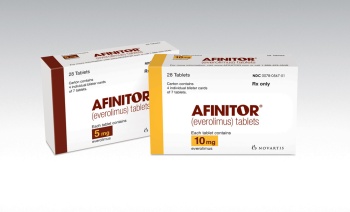Product
Afinitor
Approval Date
March 30, 2009
Release Date
April 2009
Company
Novartis Pharmaceuticals
Class
Antineoplastic agent (mTOR kinase inhibitor).
Indication
Advanced renal cell carcinoma after failure of treatment with sunitinib or sorafenib.
Active Ingredient
Everolimus
Agency Roster
RCW Group
Marketing Strategy/Execution
Afinitor, the latest anti-cancer med to spring from Novartis’ bustling oncology franchise, launched to professionals in the first half of 2009. Tactics have included multi-page journal buys in the major oncology titles, as well as a product website which uses Flash animation to bring the professional campaign to life. Afinitor, a once-daily, oral drug for treating advanced kidney cancer, is being positioned as a second-line alternative, although it’s the first therapy for patients with advanced renal cell carcinoma (RCC) after failure of treatment with Sutent (sunitinib) or Nexavar (sorafenib). RCW Group has handled the HCP launch and is reportedly working on a direct-to-patient component. Afinitor is being studied in many cancer types, and successive approvals could spur additional marketing.
Also in the Pipeline (courtesy of Adis R&D Insight)
Drug: AV 951
Manufacturer: AVEO
Indication: Renal cancer
Active ingredient: Tivozanib
Phase: III
Drug: AG013736
Manufacturer: Pfizer
Indication: Renal cancer (second line)
Active ingredient: Axitinib
Phase: III
Drug: TroVax
Manufacturer: Oxford BioMedica
Indication: Renal cancer
Active ingredient: vaccine
Phase: III
Drug: Thalomid
Manufacturer: Univ. of Pennsylvania
Indication: Renal cancer
Active ingredient: Thalidomide
Phase: III
Drug: Reniale
Manufacturer: FBM Pharma
Indication: Renal cancer
Active ingredient: Renal cancer vaccine
Phase: III
Drug: WX G250
Manufacturer: Esteve
Indication: Renal cancer
Active ingredient: Monoclonal antibody G250
Phase: III
Source: Wolters Kluwer Pharma Solutions
Recent MM&M Coverage
MM&M All-Stars Company of the Year: Novartis
Company News: Novartis
Adverse Reactions
Pneumonitis (reduce dose and/or manage with corticosteroids), infections (discontinue if invasive systemic fungal infection develops), stomatitis (treat with non-alcoholic, non-peroxide mouthwash), asthenia, fatigue, cough; increased serum creatinine, blood glucose, lipids; decreased hemoglobin, platelets, neutrophils, serum phosphate; others.
Adults
Swallow whole with water. 10mg once daily. Moderate hepatic dysfunction (Child-Pugh class B), or adverse reactions: reduce to 5mg once daily. Concomitant strong CYP3A4 inducers: may increase to 15–20mg once daily. Continue as long as benefit observed or until unacceptable toxicity occurs.
Children
Not recommended.
Precautions
Severe hepatic impairment (Child-Pugh class C): not recommended. Moderate hepatic impairment: reduce dose. Pre-existing invasive fungal infections: treat before starting. Monitor CBCs, renal function, lipids, blood glucose, and for pneumonitis and infections. Pregnancy (Cat.D), nursing mothers: not recommended.
Interactions
Avoid live vaccines. Potentiated by moderate to strong CYP3A4 inhibitors, P-glycoprotein inhibitors; avoid (eg, ketoconazole, itraconazole, clarithromycin, atazanavir, nefazodone, saquinavir, telithromycin, ritonavir, amprenavir, indinavir, nelfinavir, delavirdine, fosamprenavir, voriconazole, aprepitant, erythromycin, fluconazole, grapefruit juice, verapamil, diltiazem). Antagonized by strong CYP3A4 inducers; avoid (eg, dexamethasone, phenytoin, carbamazepine, rifampin, rifabutin, phenobarbital); increase everolimus dose if used.









